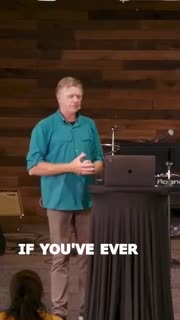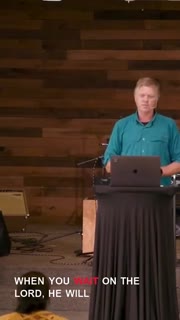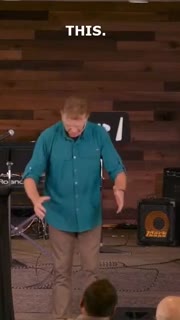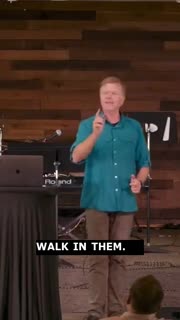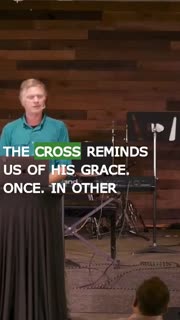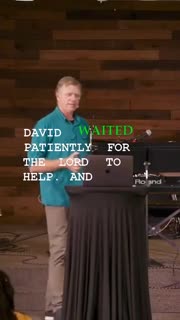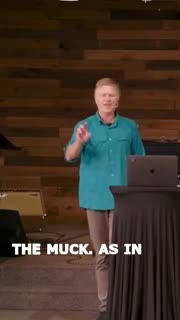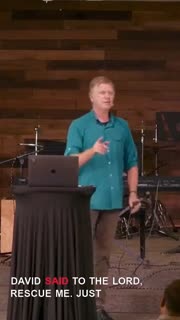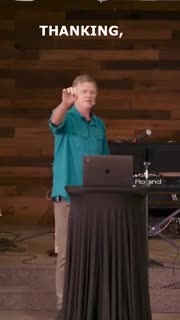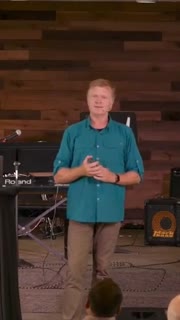From Despair to Hope: Trusting God's Compassion
Devotional
Sermon Summary
Bible Study Guide
Sermon Clips
### Quotes for Outreach
1. "If you've ever felt stuck, stuck where you're in the mud, in the miry bog, you're stuck, you can't go anywhere, you just feel like you're stuck, this psalm is for you. This psalm is filled with all of those wonders. I'm going to read Psalm 40 now. As I read it, just listen to the words, look at the images, see what they say and they convey, as you just hear from David's old pen, through the power of the Holy Spirit, you hear his words speak to you." [36:15] (34 seconds)
2. "When you wait on the Lord, he will always turn to you, and he will always hear you. Thank you. Don't let that go past. Don't let that, let that, a little key moment, just, just evaporate. When you turn to the Lord, he will always hear you." [48:32] (18 seconds)
3. "Imagine this. You're in the mud. Imagine what it's doing to your clothes, your skin. How far down in the mud are you? Doesn't matter. Take God's hand. And God will pick you up. And God will wash you off. And God will cleanse you. God will make you clean again. Church, do you see the forgiveness in this passage? Do you see that when you are clean, you have a new song?" [01:07:12] (29 seconds)
4. "Church, God is thinking great thoughts over us. He wants us to walk in them. He doesn't want us to walk in the mud and the mire and the muck and to dwell in that. He wants us to be lifted up, and today I hope that with this sermon, you are lifted up. Whatever situation, maybe you've never trusted Jesus, and you go, I've lived in that miry bog for years, and you go, I'm about ready to put my life on the rock." [57:34] (27 seconds)
5. "The cross reminds us of his grace. Once. In other words, church, check this out. In some aspect, you're already forgiven for all of the sins, not the ones that you have confessed, but the ones that you are yet to confess. You're free. You're released. Amen. You're released. You're free. Those sins no longer have control over you. Those sins no longer have power over you. All you've got to say is, I am free. I am forgiven. I am with the Father and Jesus paid for that sin." [01:00:45] (44 seconds)
### Quotes for Members
1. "David waited patiently for the Lord to help. And now look, the Lord turned, and the Lord heard. David waited patiently. Then, at some point, the Lord turns to David. And the Lord, hears David. In other words, implied, he heard my cry. Implied, David never stopped trusting God. Because God can't hear what isn't said. And so David, whether he said it in his heart, or he said it out loud, Lord, help. It was a cry. It was a cry. Lord, help." [47:00] (36 seconds)
2. "David confessed the muck. As in the muck. And I've got to confess it. So David confessed the muck. After David confessed the muck, David challenges others with their muck. He challenges others. He says, many will see what he has done and be amazed. They will put their trust in the Lord. It is, but it's amazing. If David can get out of, if God can get David out of that, God can help me out of my situation." [53:58] (30 seconds)
3. "David said to the Lord, rescue me. Just simply because David was a man after God's own heart does not mean that there weren't people after David. Look what he says. He says, humiliate those who seek me harm. That's a tough little statement. God, humiliate those who seek me harm. It's an interesting prayer to pray, isn't it? For people who personally want you to suffer, personally want to humiliate you, personally want to see your downfall." [01:05:02] (37 seconds)
4. "Thanking, rejoicing, understanding, sharing the Lord's grace with others. There's a pattern here. Here's the pattern. As you get to share the Lord's grace with others, what happens is David gets to then share, he gets to then share the grace that God has given to him, the grace that he was in the mud, he was in the mire, he was in the muck. And by the way, at the end of the psalm he is still poor and he is still needy, right?" [01:02:20] (25 seconds)
5. "May God's eyes always look your direction. May His ear always hear your voice. May His attention be focused on you. And may you know beyond a shadow of a doubt that the good God is here to rescue and cleanse you and restore you. And we get the joy of celebrating what He has done through Jesus Christ today." [01:08:17] (28 seconds)
Ask a question about this sermon
1. "If you've ever felt stuck, stuck where you're in the mud, in the miry bog, you're stuck, you can't go anywhere, you just feel like you're stuck, this psalm is for you. This psalm is filled with all of those wonders. I'm going to read Psalm 40 now. As I read it, just listen to the words, look at the images, see what they say and they convey, as you just hear from David's old pen, through the power of the Holy Spirit, you hear his words speak to you." [36:15] (34 seconds)
2. "When you wait on the Lord, he will always turn to you, and he will always hear you. Thank you. Don't let that go past. Don't let that, let that, a little key moment, just, just evaporate. When you turn to the Lord, he will always hear you." [48:32] (18 seconds)
3. "Imagine this. You're in the mud. Imagine what it's doing to your clothes, your skin. How far down in the mud are you? Doesn't matter. Take God's hand. And God will pick you up. And God will wash you off. And God will cleanse you. God will make you clean again. Church, do you see the forgiveness in this passage? Do you see that when you are clean, you have a new song?" [01:07:12] (29 seconds)
4. "Church, God is thinking great thoughts over us. He wants us to walk in them. He doesn't want us to walk in the mud and the mire and the muck and to dwell in that. He wants us to be lifted up, and today I hope that with this sermon, you are lifted up. Whatever situation, maybe you've never trusted Jesus, and you go, I've lived in that miry bog for years, and you go, I'm about ready to put my life on the rock." [57:34] (27 seconds)
5. "The cross reminds us of his grace. Once. In other words, church, check this out. In some aspect, you're already forgiven for all of the sins, not the ones that you have confessed, but the ones that you are yet to confess. You're free. You're released. Amen. You're released. You're free. Those sins no longer have control over you. Those sins no longer have power over you. All you've got to say is, I am free. I am forgiven. I am with the Father and Jesus paid for that sin." [01:00:45] (44 seconds)
### Quotes for Members
1. "David waited patiently for the Lord to help. And now look, the Lord turned, and the Lord heard. David waited patiently. Then, at some point, the Lord turns to David. And the Lord, hears David. In other words, implied, he heard my cry. Implied, David never stopped trusting God. Because God can't hear what isn't said. And so David, whether he said it in his heart, or he said it out loud, Lord, help. It was a cry. It was a cry. Lord, help." [47:00] (36 seconds)
2. "David confessed the muck. As in the muck. And I've got to confess it. So David confessed the muck. After David confessed the muck, David challenges others with their muck. He challenges others. He says, many will see what he has done and be amazed. They will put their trust in the Lord. It is, but it's amazing. If David can get out of, if God can get David out of that, God can help me out of my situation." [53:58] (30 seconds)
3. "David said to the Lord, rescue me. Just simply because David was a man after God's own heart does not mean that there weren't people after David. Look what he says. He says, humiliate those who seek me harm. That's a tough little statement. God, humiliate those who seek me harm. It's an interesting prayer to pray, isn't it? For people who personally want you to suffer, personally want to humiliate you, personally want to see your downfall." [01:05:02] (37 seconds)
4. "Thanking, rejoicing, understanding, sharing the Lord's grace with others. There's a pattern here. Here's the pattern. As you get to share the Lord's grace with others, what happens is David gets to then share, he gets to then share the grace that God has given to him, the grace that he was in the mud, he was in the mire, he was in the muck. And by the way, at the end of the psalm he is still poor and he is still needy, right?" [01:02:20] (25 seconds)
5. "May God's eyes always look your direction. May His ear always hear your voice. May His attention be focused on you. And may you know beyond a shadow of a doubt that the good God is here to rescue and cleanse you and restore you. And we get the joy of celebrating what He has done through Jesus Christ today." [01:08:17] (28 seconds)
